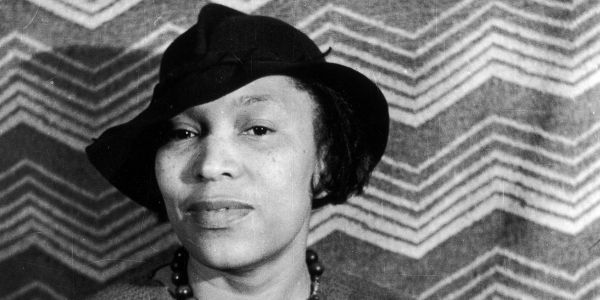 |
| Zora Neale Hurston |
This is a guest post by Martyna Przybysz.
Hurston’s novel has found a huge following not only amongst African-American readers and writers, such as Alice Walker, but ever since being brought into the spotlight back in the 1970s, it has had a growing female readership. It is not an easy novel to get through – the use of local dialects, and the ever changing narrative styles, make it an almost laborious read. As noted by a Black British writer, Zadie Smith, in the introduction to the novel from 2007 “Hurston rejected the ‘neutral universal’ for her novels – she wrote unapologetically in the black-inflected dialect in which she was raised.””Unapologetic” is the key word here – Zora, as the writer, and a woman, went against the grain, just like her character, Janie. That is what makes the novel compelling and draws the reader in. Similarly so, the character potrayed by Halle Berry is driving the film’s narrative.
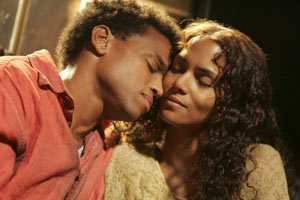 |
| Janie and Tea Cake |
Janie Crawford is a survivor. In the opening scene of the film, just like in the novel, she has just come back from burying the dead – the only love of her life, a light-hearted slacker, Tea Cake. The first sentence signals the narrative that will later dominate the entire movie. It could be argued that film, being a visual medium, has an advantage over the written word in establishing the mood, and here it does so with the jittery camera movements, and extreme close-ups of Janie’s body. “There’s two things everybody got to find out for theyselves, they got to find out about love, and they got to find out about living” she says, as she stumbles through a village path, in nothing but dirty overalls.
Isn’t it a powerful, universal statement? It is indeed; however, as the film progresses, we lose the sense of identity search that is so prevalent in the novel. We are instead invited to a roller-coaster ride that are Halle Berry’s… wait, Janie Crawford’s romantic endeavours. Because yes, as aptly pointed out by one of the reviewers, “she’s Halle Berry – and the movie never lets you forget it.”
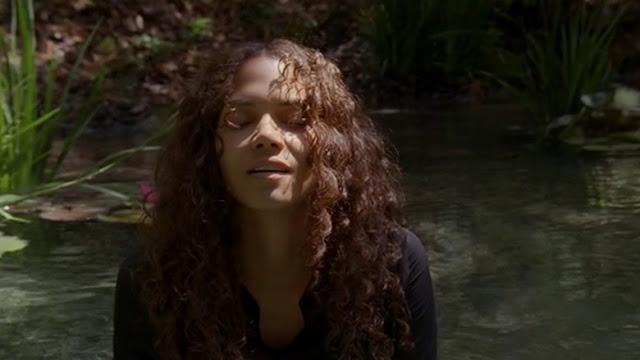 |
| Halle Berry as Janie |
Perhaps because I got to watch the film prior to reading the novel, it was easier for me to accept Halle’s interpretation of Janie. I couldn’t, however, shake off the feeling that a multilayered novel has been reduced to a Harlequin-esque epic drama. Having Oprah Winfrey
summarise the film in the trailer only made that impression stronger. What the film fails to do is adapt the strong visual imagination of the writer that built a much more complex identity for Janie.
Whilst the novel slowly introduces us to Janie, and goes as far back as her childhood, in the film we are immediately transported back to that unlucky afternoon when her Gran spots her kissing a regular farm boy and decides to give her away to a rich land-owner. Logan Killicks is a non-invasive older man, who places Janie in the role of a housewife. It is by his side that she grows into a woman and realizes that her romantic dreams of love may not be fulfilled. It isn’t long, however, until she meets a handsome gentleman called Joe Starks (played by Ruben Santiago-Hudson) and runs away with him. And here again, the search for her own identity as a female seems rather futile. Janie becomes an accessory and feels restricted by her relationship and the social role (being the Mayor’s wife) that she has to fulfill. “I think it keep us in a kinda strain,” she says. She’s just there to stay by her man’s side and should not have any further expectations, as according to Janie’s granmother “de nigger woman is de mule uh de world.” Janie, however, will not rest until she finds happiness in a relationship.
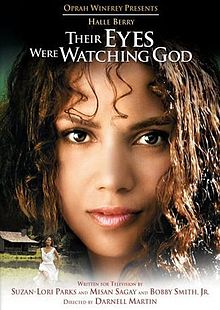 |
| DVD cover |
Without fail, Halle Berry conveys her character’s search with utmost sensitivity and attention to detail – it is all in the small gestures that we learn about Janie and her heart’s desires. She wants to feel and love and share that feeling with the world, but most importantly, she adapts this approach to life and the world in order to find her own sacred place in the arms of a caring man. That, for her, is the destination. As a contemporary woman, I find this concept a beautiful one in itself, but not quite liberating, and based on a presumption that a woman cannot be whole without a man. The search for female identity through the romantic love of a man emanates from the character of Janie throughout the film. She loves nature, and she loves God; she’s curious, and open, and somewhat free and wild. Through the camera work and sentimental music,
Their Eyes Were Watching God explores that aspect of Janie’s personality, and when oppressed by her second marriage, she confesses to the audience that she is not “petal-open anymore.” What a striking, if slightly sentimental, analogy that brings to mind one of my favourite quotes from Anais Nin: “And the day came when the risk to remain tight in a bud was more painful than the risk it took to blossom.”
What the film, as well as the novel, are suggesting is not only that small town mentality is something that Janie has long outgrown, but by building her identity as a female in her own right, she is also going against the stale racial and gender stereotypes that enslave her community. When she finally meets “the love of her life,” Tea Cake (played by Michael Ealy), the passion between the two is undeniable, and so is everyone’s harsh judgment about their romance. But Janie is not a rebel; she simply follows her heart and is not afraid of being herself. Sexuality is an important aspect of her identity as a woman, and she is way ahead of her time with her natural and unconstrained ability to explore it.
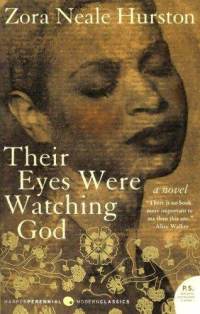 However controversial or open-minded its description of sexual scenes was at the time when the novel was published (perhaps less when it was later read and fully acknowledged), Darnell Martin, the director of the TV movie, has made the scenes almost poetically erotic. The main sex scene between Halle and Michael brings us to a finale of the passion that has been building up between their protagonists – Janie looks and acts twenty years younger, just like a woman who has found herself by finding love in another. “I felt for the very first time like I was living my life – I had love, and it was real. Tea Cake gave me the whole world, every day.” That concludes Janie’s search for love, as well as her search for identity.
However controversial or open-minded its description of sexual scenes was at the time when the novel was published (perhaps less when it was later read and fully acknowledged), Darnell Martin, the director of the TV movie, has made the scenes almost poetically erotic. The main sex scene between Halle and Michael brings us to a finale of the passion that has been building up between their protagonists – Janie looks and acts twenty years younger, just like a woman who has found herself by finding love in another. “I felt for the very first time like I was living my life – I had love, and it was real. Tea Cake gave me the whole world, every day.” That concludes Janie’s search for love, as well as her search for identity.
Although I find it thin and slow in places, I struggle to dislike Darnell Martin’s adaptation of Hurston’s novel. After all, it manages to carry a powerful message, despite it not being in favour of the current feminist perception of gender roles and female identity. Yet remembering that it is set in the early 20th century reality of African-Americans, one has to admit that it does a fair job at depicting a woman who goes beyond her time. Even if it does so not without pretense, and in a more simplistic way than Hurston’s beautiful novel.
———-




 However controversial or open-minded its description of sexual scenes was at the time when the novel was published (perhaps less when it was later read and fully acknowledged), Darnell Martin, the director of the TV movie, has made the scenes almost poetically erotic. The main sex scene between Halle and Michael brings us to a finale of the passion that has been building up between their protagonists – Janie looks and acts twenty years younger, just like a woman who has found herself by finding love in another. “I felt for the very first time like I was living my life – I had love, and it was real. Tea Cake gave me the whole world, every day.” That concludes Janie’s search for love, as well as her search for identity.
However controversial or open-minded its description of sexual scenes was at the time when the novel was published (perhaps less when it was later read and fully acknowledged), Darnell Martin, the director of the TV movie, has made the scenes almost poetically erotic. The main sex scene between Halle and Michael brings us to a finale of the passion that has been building up between their protagonists – Janie looks and acts twenty years younger, just like a woman who has found herself by finding love in another. “I felt for the very first time like I was living my life – I had love, and it was real. Tea Cake gave me the whole world, every day.” That concludes Janie’s search for love, as well as her search for identity. 